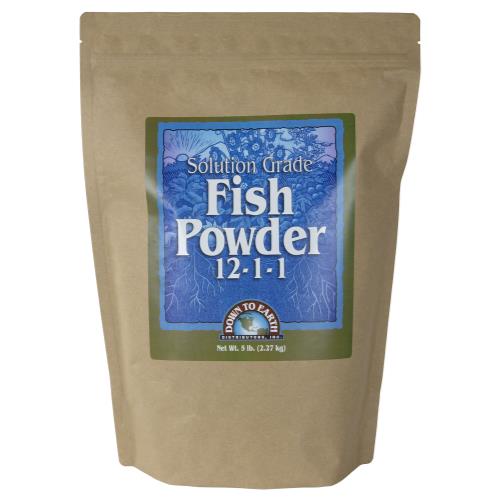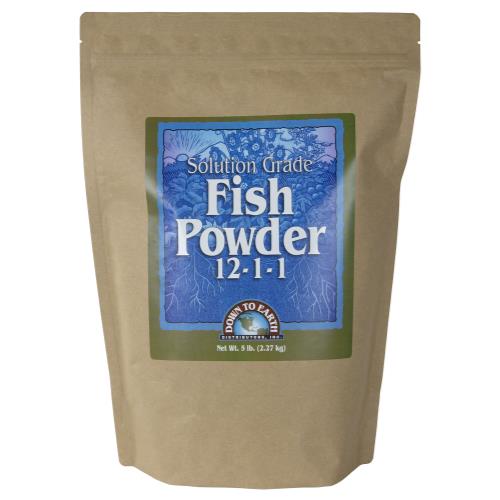Down To Earth
Down To Earth Fish Powder - 5 lb (5/Cs)
Down To Earth Fish Powder - 5 lb (5/Cs)
Out of stock
Couldn't load pickup availability
Payment options
- Fast Delivery
- Easy Returns
- Secure Checkout
Description
Description
Down To Earth Fish Powder is a natural and sustainable fertilizer derived from high-quality fish meal. This organic fertilizer is rich in essential nutrients, amino acids, and beneficial microorganisms. It provides a convenient and effective way to boost plant growth, improve soil fertility, and enhance overall crop quality. Fish powder is suitable for various types of plants, making it a versatile choice for gardeners, farmers, and horticulturists who are committed to environmentally friendly and organic gardening practices.
Key Features:
1. Rich in Nutrients: Fish powder is a potent source of essential nutrients, including nitrogen, phosphorus, and potassium (N-P-K), as well as micronutrients like calcium and magnesium.
2. Amino Acids: Contains amino acids that promote vigorous plant growth, enhance flowering and fruiting, and increase the plant’s resistance to stress.
3. Beneficial Microorganisms: Encourages the growth of beneficial soil microorganisms that aid in nutrient breakdown and uptake, improving soil health.
4. Slow-Release: Provides a slow-release source of nutrients, ensuring a steady supply to plants over time.
5. Odor-Free: Unlike raw fish, fish powder is odor-free, making it a practical and convenient choice for gardeners.
6. Sustainable: Made from sustainable fish sources, contributing to eco-friendly and ethical gardening practices.
Benefits:
• Plant Nutrition: The N-P-K ratio in fish powder supports plant growth, blooming, and root development.
• Soil Improvement: It enhances soil structure, promotes aeration, and increases water-holding capacity.
• Flavor and Aroma: For edible crops, fish powder can contribute to improved flavor and aroma.
Stress Tolerance: Amino acids and micronutrients boost plant resilience, helping plants cope with environmental stressors.
• Organic Gardening: A preferred choice for organic gardening due to its minimal environmental impact and compatibility with organic certification standards.
Applications:
Down To Earth Fish Powder can be applied in various ways:
• Incorporate into Soil: Mix fish powder into the soil before planting, ensuring it’s well-blended with the topsoil.
• Topdressing: Sprinkle fish powder on the soil surface around established plants, then water it in.
• Compost: Add fish powder to compost piles to enrich the nutrient content of the finished compost.
• Transplanting: Use during transplanting to provide a nutrient-rich environment for new seedlings.
Usage Instructions:
• Garden Beds: Apply 5-10 pounds of Down To Earth Fish Powder per 1,000 square feet and work it into the topsoil.
• Container Plants: Use 1-2 tablespoons of fish powder for smaller pots, and increase the amount for larger containers.
• Composting: Add 1-2 pounds of fish powder per cubic yard of compost materials for optimal nutrient enrichment.
• Transplanting: Sprinkle a small amount of fish powder in the planting hole for each new seedling.
Down To Earth Fish Powder is an excellent choice for gardeners and growers who seek an eco-friendly, organic, and sustainable fertilizer to nourish their plants and improve soil quality. Whether you’re cultivating flowers, vegetables, herbs, or fruit trees, this nutrient-rich fish powder can contribute to healthier, more robust plants and a flourishing garden.
Share

INFORMATION QUESTIONS
FREQUENTLY ASKED QUESTIONS
What is Hydroponics?
Hydroponics is the science of growing plants without soil. The plants thrive on the nutrient-water solution alone. The growing medium merely acts as a support for the plants and their root systems while the solution passes freely. The growing medium, if any, is totally inert.
What types of plants grow best hydroponically?
Anything can be grown hydroponically, but some plants prove to be more space efficient. Some plants we suggest are tomatoes, sweet peppers, hot chilies, lettuce, spinach, squash, cucumbers, broccoli, beans, snow peas, herbs and flowers of all types.
Can you REALLY get better yields/quicker growth?
Absolutely. The plants, when receiving everything they need, tend to be healthier, faster growing and generally more productive. You can expect 30% faster growth with many crops.
What are the watering cycle timelines hydroponic systems?
Once the reservoir is filled with nutrients, it is time to put your hydro system to work! The ease of hydroponics is automation – automation is achieved by putting the pump on a timer according to your watering needs. The watering cycle depends on growth stage, growing medium and hydroponic system. In an ebb and flow or drip system with rockwool as the medium, seedlings, clones and plants in the early vegetative stage require watering only once a day for 15-30 minutes (twice a day for higher temps). Mature, flowering and fruiting plants require a heavier feed and can be fed once a day for 30 minutes (twice a day for higher temps). Typically soiless mixes and coco fiber can be watered for about 15 minutes twice a day, and can be adjusted for heavier feeding during the flowering and fruiting stage or higher temps. ViaStone, Hydroton, Grow Rocks, and Silicate mediums need to be watered more frequently – a constant drip for drip systems, and about 15-30 minutes every 3 hours for ebb and flow systems and can be adjusted for heavier feeding during the flowering and fruiting stage or higher temps. Aeroponic systems require frequent watering cycles; 30-60 seconds every few minutes or a constant spray.
What do I need to test pH? How do I test pH?
pH has a range from 0 (acidic) – 14 (alkaline), with 7 being neutral. A proper hydroponic pH range is between 5.5 to 6.2 for most hydroponic crops. For specific crop pH, check out our Plant Guide. pH must remain within the proper range for good plant health, disease resistance, and proper nutrient uptake. pH is maintained by adding pH Up and pH Down to the nutrient solution. For more information, see the Testssection of our site.
How will the flavor compare to my outdoor grown, organic produce?
The taste may be even better! This is simply due to the fact that the hydroponically grown plants are getting everything they need, when they need it. Don’t be fooled by “hot house” produce grown commercially. The grower’s primary concern is shipability and storage, not flavor. When you grow your own vegetables at home, you can expect nothing less than excellent results. Plus, hydroponically grown produce has the added benefit of a longer shelf life.

